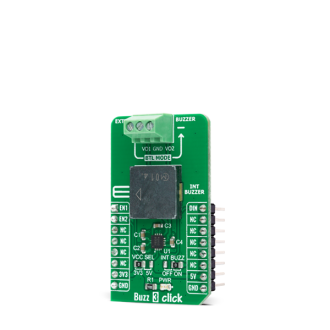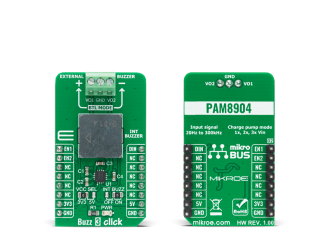
We strongly encourage users to use Package manager for sharing their code on Libstock website, because it boosts your efficiency and leaves the end user with no room for error. [more info]

Rating:
Author: MIKROE
Last Updated: 2020-12-16
Package Version: 1.0.0.0
mikroSDK Library: 1.0.0.0
Category: Speakers
Downloaded: 2904 times
Not followed.
License: MIT license
Buzz 3 Click is a compact add-on board that contains a sounder driver that produces higher volume with a lower current. This board features the PAM8904, a piezo-sounder driver with an integrated Multi-Mode charge pump boost converter from Diodes Incorporated.
Do you want to subscribe in order to receive notifications regarding "Buzz 3 click" changes.
Do you want to unsubscribe in order to stop receiving notifications regarding "Buzz 3 click" changes.
Do you want to report abuse regarding "Buzz 3 click".


Library Description
The library covers all the necessary functions to control Buzz 3 Click board™. Library performs a standard GPIO interface communication.
Key functions:
BUZZ3_RETVAL_T buzz3_set_gain_operating_mode ( uint8_t op_mode ) - Set gain operating mode function.Examples description
The application is composed of three sections :
void application_task ( )
{
mikrobus_logWrite( " Play the music ", _LOG_LINE );
buzz3_melody( );
mikrobus_logWrite( "---------------------", _LOG_LINE );
Delay_ms( 1000 );
}
Additional Functions :
buzz3_sound_init( ) - Configures the appropriate MCU pin for sound generation.buzz3_melody( ) - Demo melody - plays Imperial March using Sound library.Other mikroE Libraries used in the example:
Additional notes and informations
Depending on the development board you are using, you may need USB UART click, USB UART 2 click or RS232 click to connect to your PC, for development systems with no UART to USB interface available on the board. The terminal available in all MikroElektronika compilers, or any other terminal application of your choice, can be used to read the message.